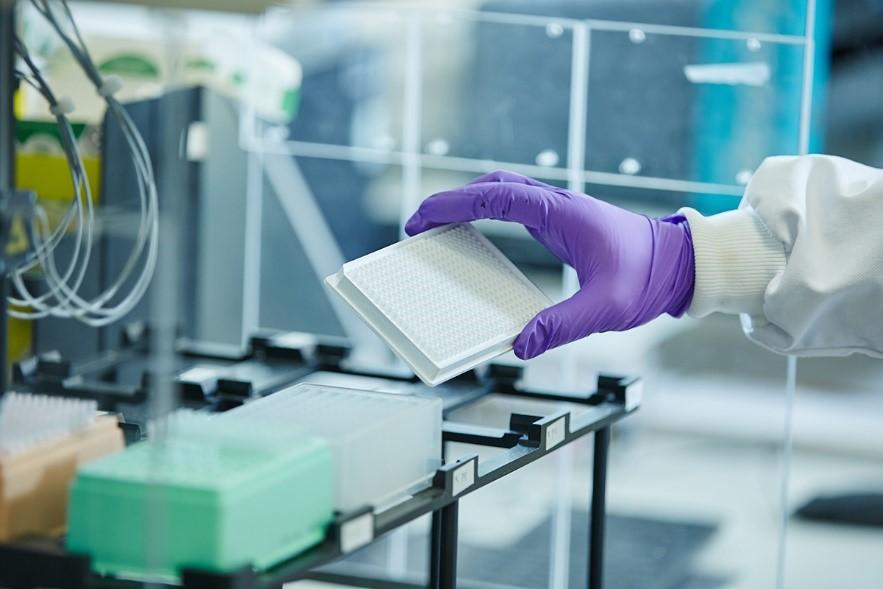- About
-
Solutions
-
Services
- Biosciences
- Chemistry
- Integrated Drug Discovery
- Computer Aided Drug Design
- Hit Identification
- DMPK
- Target Classes and Modalities
- Therapeutic Areas
-
A-Z
- A
- B
- C
- D
- E
- F
- G
- H
- I
- K
- L
- M
- N
- O
- P
- R
- S
- T
- V
- X
-
Services
- Library
- News & Events
- Careers
Biochemical Assays
Biochemical assay development and validation for assessing compound activity

A fundamental aspect of almost every drug discovery project is the development of assays that measure the modulation of isolated disease targets and key off-targets by test compounds, and the routine use of these assays to guide the optimisation process.
Generating the information you need on key parameters such as potency, mode of inhibition, selectivity and kinetics, is essential all the way from hit identification, through the subsequent medicinal chemistry optimisation process, to the characterisation of candidate drugs.
At Domainex we fully understand this, and the importance of providing you with reliable and reproducible data at every stage. Our dedicated Assay Biology team has a wealth of experience of building validated, quality-controlled biochemical assays.
Assay Development
Our skilled assay biologists are able to develop and validate assays for enzymes, receptors and protein-protein interactions using cutting-edge detection and liquid-handling instruments, and to implement these in a variety of formats down to 384-well microtitre plates.
We have access to state-of-the art plate readers that quantify a variety of read-outs, including:
- Light absorbance
- Fluorescence intensity and polarisation
- HTRF®, TR-FRET
- Luminescence, BRET
- AlphaLISA®, AlphaScreen®
- FLIPR
- LC-MS
Domainex is also able to clone and express your target protein, if required to support assay development.
Enzymatic Assays
Our experienced enzymologists will quickly establish optimum buffer conditions, and measure enzyme parameters such as kcat. and Km for your target. We also prosecute mechanism of action studies and in-depth enzymatic assays to determine inhibitor on/off rates, Ki values and kinact/KI for slow off-rate or covalent binders.
We routinely run panels of assays from related or different enzyme target classes to determine the selectivity of key compounds.
For an example see our white paper: Biochemical kinase assay to improve potency and selectivity
Receptor Ligand-Binding Assays
Once our molecular and cell biology experts have generated a cell line over-expressing your receptor or membrane-bound target of interest, our receptor pharmacologists are adept at determining receptor Bmax, Kd of known ligands and optimising assay systems ahead of screening for levels of agonism and/or antagonism with known ligands and test compounds.
Domainex has also developed a technology known as PoLiPa for the detergent-free solubilisation of membrane targets.
Protein-Protein Interactions
Domainex scientists have established a number of PPI assays using AlphaLISA®, FRET and fluorescence polarisation technologies. For example, we developed an assay to characterise compounds that block the interaction between the oncogenic protein RAS and downstream effector proteins such as RAF and Ral.1 Cell-based assays to study PPIs can also be developed using, for example, the Promega Nanoluc®-derived BRET or HiBiT/LgBiT systems.
References
- Small molecule inhibitors of RAS-effector protein interactions derived using an intracellular antibody fragment. Camilo E. Quevedo, Abimael Cruz-Migoni, Nicolas Bery, Ami Miller, Tomoyuki Tanaka, Donna Petch, Carole J.R. Bataille, Lydia Y.W. Lee, Phillip S. Fallon, Hanna Tulmin, Matthias T. Ehebauer, Narcis Fernandez-Fuentes, Angela J. Russell, Stephen B. Carr, Simon E.V. Phillips and Terence H. Rabbitts., Nat Commun 9, 3169 (2018).

Start your next project with Domainex
Contact one of our experts today